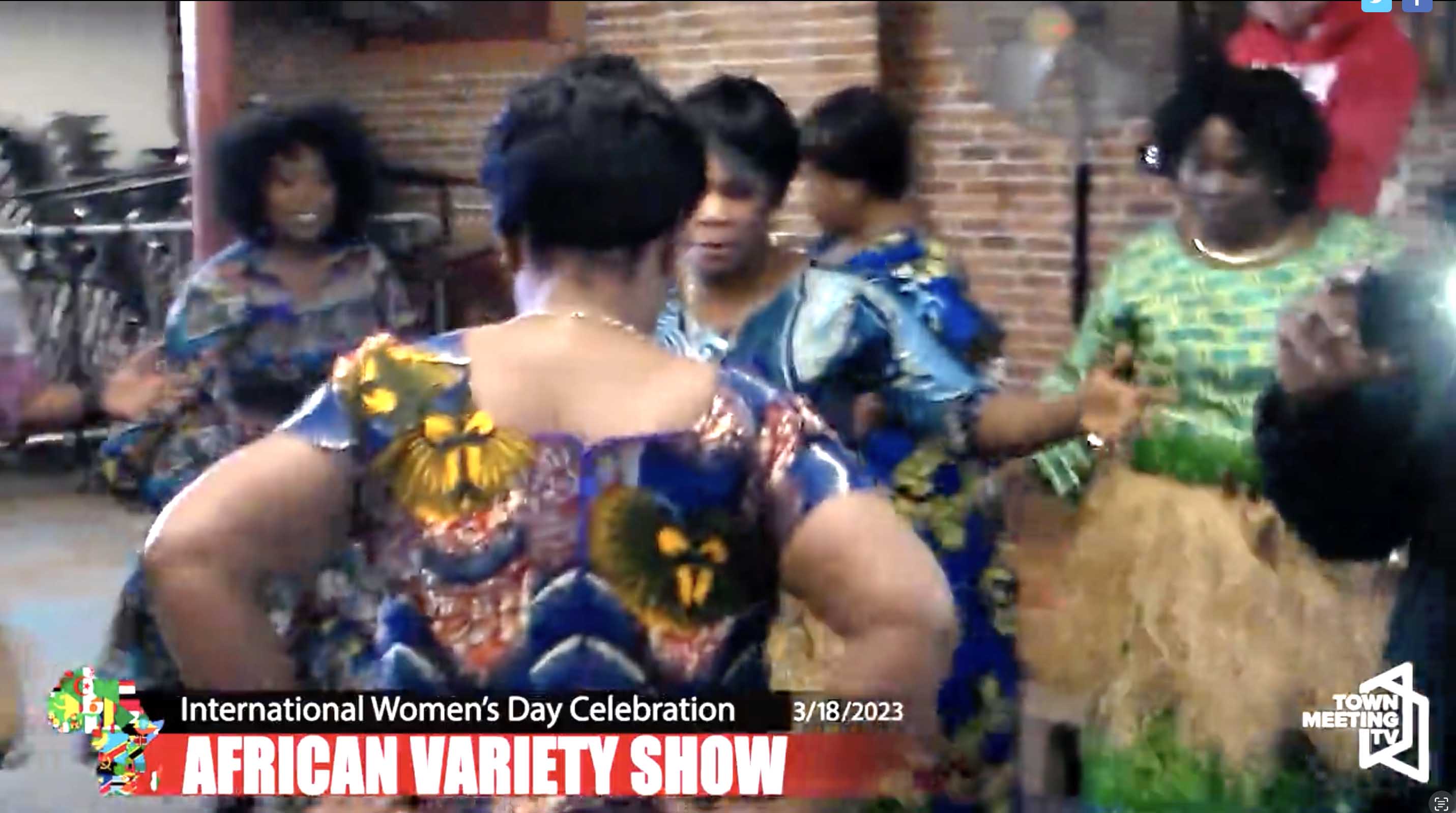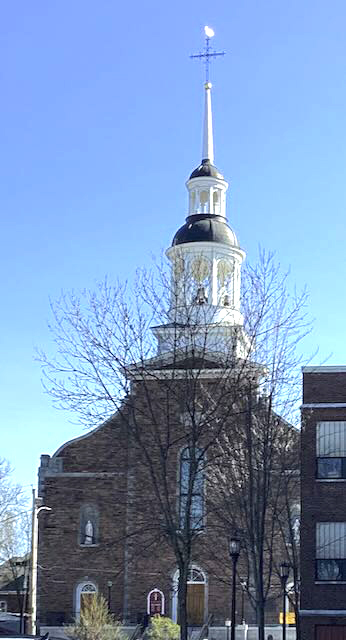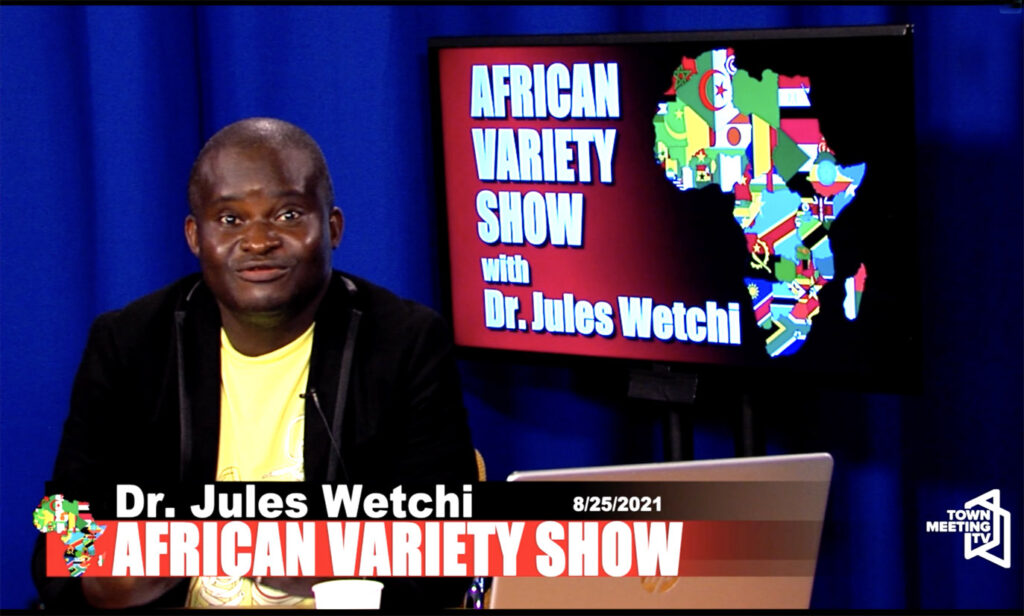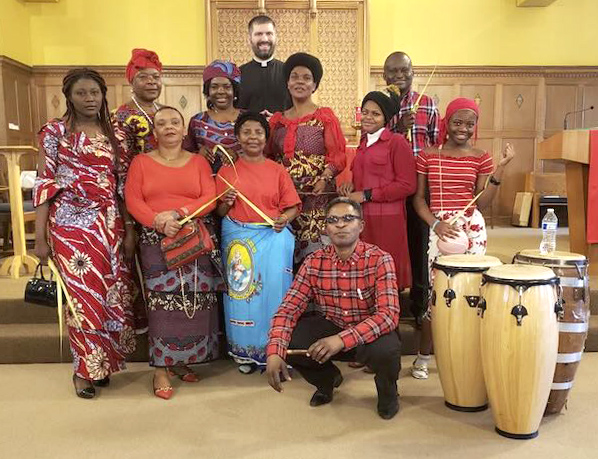As long as immigrants have arrived in the United States, their peers have been ready to help them adjust to new lives. Stressed and uprooted by their previous existences, and often lacking U.S. government policies to welcome them, they would otherwise be overwhelmed by the strange and often hostile environment. Those who successfully made the transition historically formed immigrant aid associations, to provide new arrivals with constructive advice, assistance, and encouragement, helping them prepare for life in their new society.
In Burlington, from around 1900, the local chapter of the Union St. Jean Baptiste d’Amérique, based on Elmwood Avenue, helped immigrants from Québec adjust to life here. Today, just a few blocks away, the Association of Africans Living in Vermont carries on the tradition, helping African immigrants obtain services and build lives of dignity in Vermont’s overwhelmingly white society.
In a remarkable convergence, the same cathedral that once was the center of Burlington’s French-Canadian Catholic community is today a center for Burlington’s French-speaking African Catholic community. The Cathedral of St. Joseph, founded as a parish in 1850 to serve French Canadian immigrants, is today a place of welcome for New Americans from French-speaking and other parts of Africa. (This second church was built three decades later.) Today Congolese Catholics can look up at the plaque reading “Église St. Joseph 1883” and nod in recognition.
For a decade now, Jules Wetchi, a native of the Democratic Republic of the Congo (DRC), has helped his fellow Africans integrate into American life. The multilingual Wetchi is a skilled communicator who knows how to reach people by speaking their diverse languages and sharing their cultures.
Life in the DRC
Like 60 percent of the DRC’s population, Wetchi is Catholic. As a youth in Kinshasa, he showed leadership ability early on, in the context of the church. He headed the youth commission for the Archdiocese of Kinshasa and even worked closely with the Kinshasa archbishop, Cardinal Laurent Monsengwo Pasinya, an adviser to Pope Francis. Since 2004, the DRC’s east has been ravaged by a war over mineral rights. Under the cardinal’s leadership, the Congolese church promoted peace, human rights, and social justice, constructing hospitals and infrastructure. (Monsengwo Pasinya died in 2021.)
While in Kinshasa, young Wetchi trained as an ophthalmologist, specializing in cataract surgery. Beyond his medical specialty, he assisted with public health. During an Ebola outbreak, he taught laypeople not to touch or wash the bodies of Ebola victims, which helped reduce transmission of plague microbes.
In 2013 Dr. Wetchi won a U.S. Diversity Visa, which U.S State Department distributed by lottery to diversify the immigrant population. Wetchi decided to migrate to Vermont. Unfortunately, his medical degree did not qualify him to practice medicine in the United States, so he got a job as a medication technician in an assisted living community. He enrolled in a master’s program at UVM, completing a degree in public health in 2019. That same year he became a U.S. citizen.
St. Joseph’s
Much to his dismay, he found that many of his fellow Catholic African immigrants were drifting away from the church. The typical mass in Vermont, after all, is held in English. To help his friends retain their faith, in 2014 Dr. Wetchi formed the French Speaking African Catholic Community and Congolese Catholic Community of Burlington. “My idea was to bring together people who had been Catholics, to pray together, share the gospel, share food, share information about integration” into American society, he explains. He helped his compatriots understand the baffling U.S. health care system and also helped them apply for jobs.
In the mid-2010s the rector at St. Joseph’s Cathedral was Father Lance Harlow, who welcomed the African Catholics. They “have survived many horrors in their own countries,” he understood, “and have made great sacrifices to move to Vermont—including loss of careers, murder of family members and that disorientation that comes from leaving one’s own culture and surroundings to be immersed in a culture and climate very different from their own. They seem to adapt with extraordinary vigor.”
In 2016 the sympathetic Father Harlow met Dr. Wetchi and offered his group a space in a chapel where they could meet and pray. Wetchi went on to train as a lay minister at the cathedral. Meanwhile Father Harlow brushed up his own French-language skills at our Alliance Française and in November 2016 began celebrating a Francophone mass once a month. (Those Francophone masses would continue until June 2021, when Father Harlow was reassigned to a St. Johnsbury parish.)
Local Access Radio
When COVID pandemic began, Burlington’s minority and immigrant communities needed special outreach with clear and accurate information. The executive director at Big Heavy World community radio (105.9 FM) asked Father Harlow to recommend a French speaker who could host a radio show. The priest recommended Dr. Wetchi, who not only had degrees in medicine and public health but also, back in Kinshasa, had developed skills in media and communication.
In September 2020 Wetchi began hosting Samedi Matin (Saturday Morning), a Francophone show that provided practical health information for surviving the pandemic, information that he leavened with African music. He even previewed the coming Sunday morning mass at St. Joseph’s: he prepared the community to sit through the anglophone service by reading over the air a French translation of the sermon and the scripture readings. Wetchi continues his radio show to this day.
The African Variety Show
“African people have an oral tradition,” he told me. “They prefer to listen and watch.” So it’s no surprise that he soon branched out into television. In August 2021 he initiated the African Variety Show on Burlington’s Town Meeting TV. Speaking by turns in French, Lingala (also known as Ngala), and Swahili, with bits of English, he explained to African communities the importance of wearing masks and getting vaccinated and boosted.
Beyond addressing the immediate public health emergency, the African Variety Show provides other information useful, even essential, to New Americans. Wetchi informs listeners about the city services available to them. He spent an entire program explaining the structure of the city government (it has “le peuple . . . au sommet”), so that new Burlingtonians would know where to go to solve a problem. In another episode he explained the logistics of voting—districts, voting places, dates, and ballots.
In 2020 the city recruited Dr. Wetchi for its Trusted Community Voices Outreach Team, a handful of community leaders who constitute “a bridge between the city and the [immigrant and minority] communities,” as he described the program to me. They have handed out masks and helped people find childcare, recovery, and employment. Communication theoretically goes both ways, as the city government learns more about the needs of Burlington’s increasingly diverse population from the Trusted Voices.
In other episodes, Wetchi informed viewers about the city’s Early Learning Initiative scholarship, which helps low-income families finance early childhood education; and CEDO’s Elmwood Avenue Shelter Pod Village, an emergency shelter of 35 shelter pods for homeless community members.
Combining Information with African Culture
Mixing information with familiar music and culture seems key to Wetchi’s effectiveness. For example, his show covered an International Women’s Day celebration that mixed information on breast cancer and cervical cancer with traditional Congolese dance and food.

His shows on city programs are interspersed with shows on music. For Advent and Christmas, the Congolese Catholic Community Choir performed songs in French, Swahili, Lingala, Kikongo, and Lari. A lively episode on Congolese Rumba, all in French, explained the Congolese and Cuban origins of this dance music genre.
Dr. Wetchi’s next project will be the New American Public Health Initiative, to further bring public health expertise to New Americans. “We need a local organization to understand better the New American psychology,” he says. The initiative will help New Americans self-manage chronic diseases, including diabetes and obesity. “In the DRC people walked much more than they do here,” he muses.
Wetchi’s projects help new Vermonters make sense of their city while also assisting and entertaining them. Northern Vermont’s Francophone community is fortunate that this public health leader and communicator is helping newcomers build second lives on a foundation of health and solid information.
Dr. Wetchi’s radio show broadcasts on Wednesdays at noon and on Saturdays at 10:00 a.m.. On local-access TV, the African Variety Show (in French, Swahili, and Lingala) appears on the fourth Thursday of each month.
And on the third Sunday of every month, the morning mass at St. Joseph’s Cathedral offers the first reading in French, and the Congolese choir sings twice. Next: May 21, 10:00 a.m. at 20 Allen Street, Burlington.
—Janet Biehl


